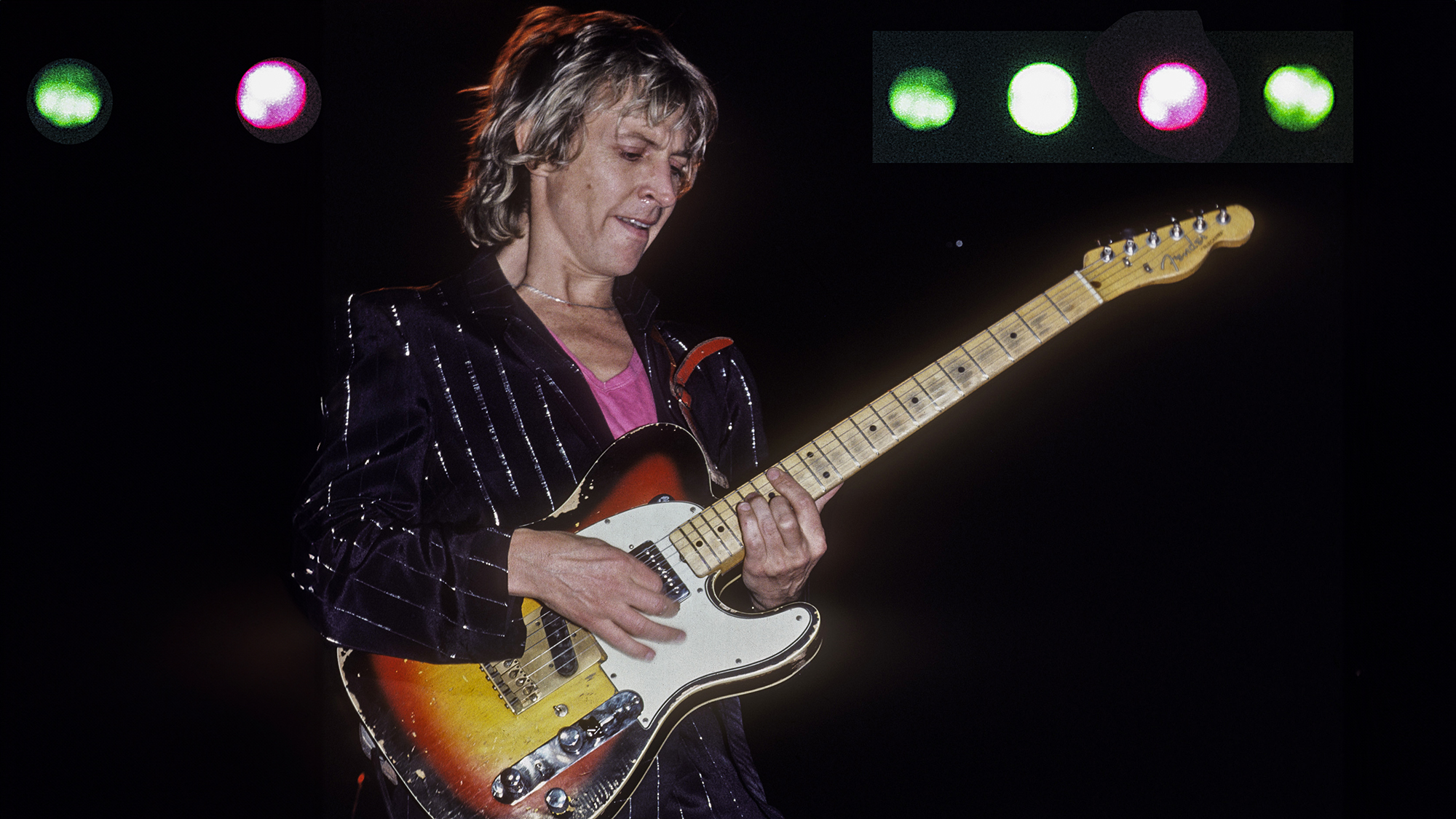“Listen to AC/DC and tell me Malcolm Young didn’t drive that band. Same with the Sex Pistols and Steve Jones. Those guys are tone merchants. That’s the club I wanted to be in”: Billy Morrison on kicking heroin, and becoming Steve Stevens' six-string foil
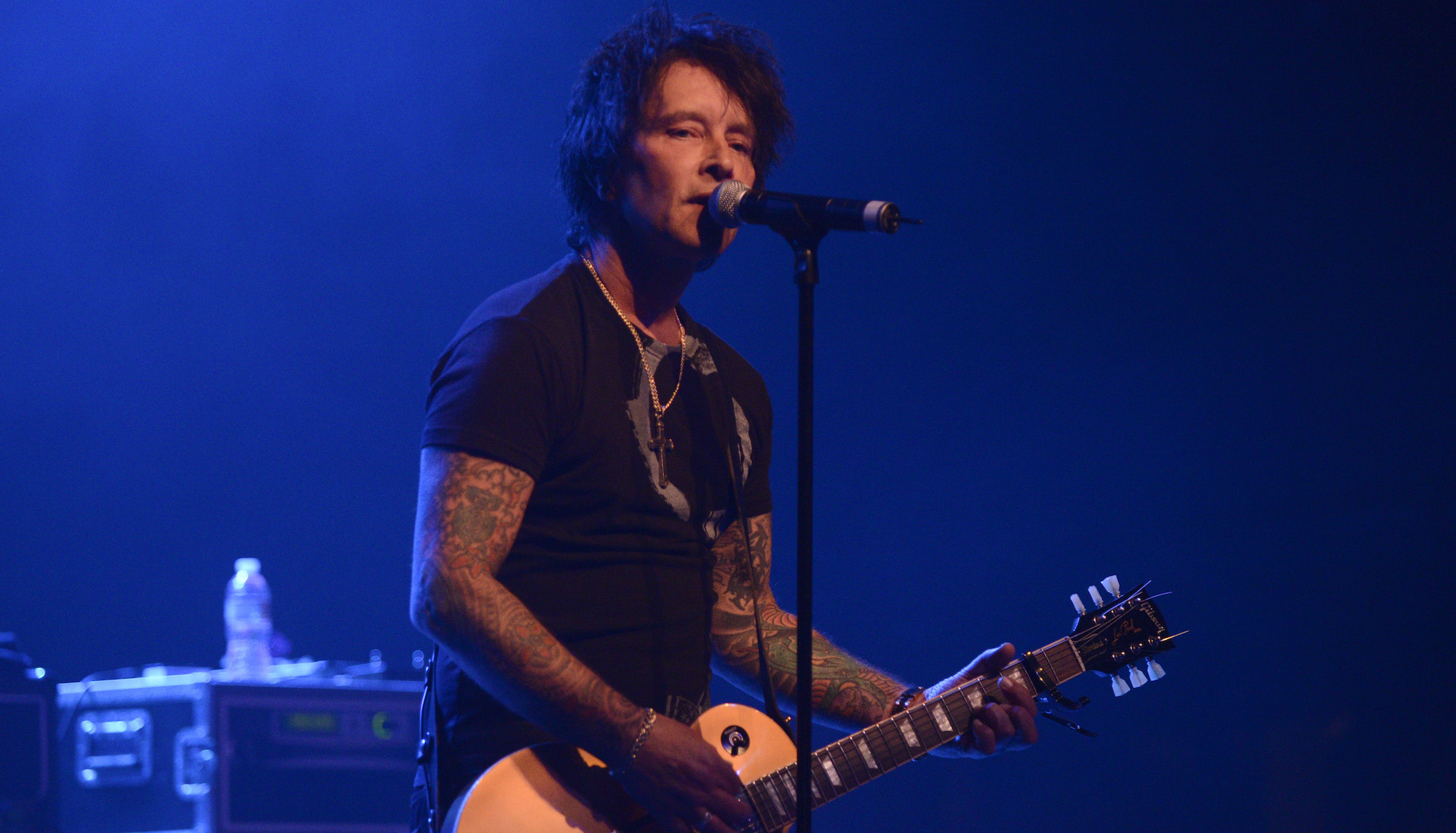
All the latest guitar news, interviews, lessons, reviews, deals and more, direct to your inbox!
You are now subscribed
Your newsletter sign-up was successful
British guitarist Billy Morrison estimates that he wasted a good 15 years of his life shooting drugs. “I loved the Sex Pistols and Johnny Thunders, and I went down that route,” he says. “But most people get the music career first and then blow their money on drugs. I did it backward.”
By the mid ’90s, Morrison was facing the end. He weighed 120 pounds and was homeless. He’d been stabbed and no one seemed to care. Even his friends had abandoned him. One night, he found himself crouching behind a garbage can in London, trying to shoot heroin into collapsed veins. ”That’s when I finally saw the light,” he says. ”I said, ‘I’m done with this. I’m going to get clean and have the career I always wanted in music.’”
He had played a bit of guitar in bands as a teenager, but at the age of 29 he decided to get serious. Becoming a virtuoso shredder was the last thing on his mind, but he loved rhythm guitar and set out to make his right hand one of the best around.
“Listen to AC/DC and tell me Malcolm Young didn’t drive that band,” he says. “Same with the Sex Pistols. It’s all about Steve Jones’ rhythm playing. Those guys are tone merchants. That’s the club I wanted to be in.”
Things turned around quickly – until they didn’t. Morrison formed a band called Stimulator and signed a deal with Geffen, but label restructuring put the group’s career on ice.
“It was a blessing in disguise,” he says. “If I had success back then, I’d be playing some craphole in the Valley right now for 10 people.” His longtime pal Billy Duffy threw him a lifeline with an invitation to play bass for a year-long Cult tour, after which Morrison relocated to Los Angeles.
Naturally gregarious, Morrison had people skills that went a long way. Superstar musicians were drawn to the personable, egoless Brit. He rounded up a group of his new friends – Dave Navarro, drummer Matt Sorum, singer Donovan Leitch, and bassist Scott Ford – and formed a rock and roll Rat Pack called Camp Freddy. The general idea was to play covers at low-key gigs and have fun. Soon enough, everybody in town wanted in, and the gigs became anything but discreet.
All the latest guitar news, interviews, lessons, reviews, deals and more, direct to your inbox!
Among the players who turned up to Camp Freddy jams was Steve Stevens. The two guitarists hit it off, and when Stevens resumed his partnership with Billy Idol, he brought Morrison into the fold as his guitar co-pilot.
“Playing with Steve and Billy has been the most remarkable experience in my whole life,” Morrison says. “Working with them has allowed me to grow as a musician so much. I don’t do what Steve does, because I can’t – and why would I even try? He’s Steve Stevens. But I’ve been able to establish my own identity and sound in the band, and I’m so grateful for their belief in me.”
He laughs, “It’s been 15 years with them. Time does fly when you’re having fun.”
Stevens guests on Morrison’s forthcoming solo album, The Morrison Project, along with Steve Vai, John 5, Ozzy Osbourne, and other high-wattage names. Out this April, it’s a fun and feisty set of full-throttle metal and electro rockers on which Morrison sings and plays the lion’s share of instruments. He even takes a hand on some solos.
“I mean, I can play leads, and the album shows that I can solo,” he says. “I’ve stood onstage with some of the best players and held my own.
“But I know that’s not really what I’m here to do. Fortunately, I’ve got a good Rolodex and was able to get some of my friends involved, and I’ve ended up with this crazy album project.”
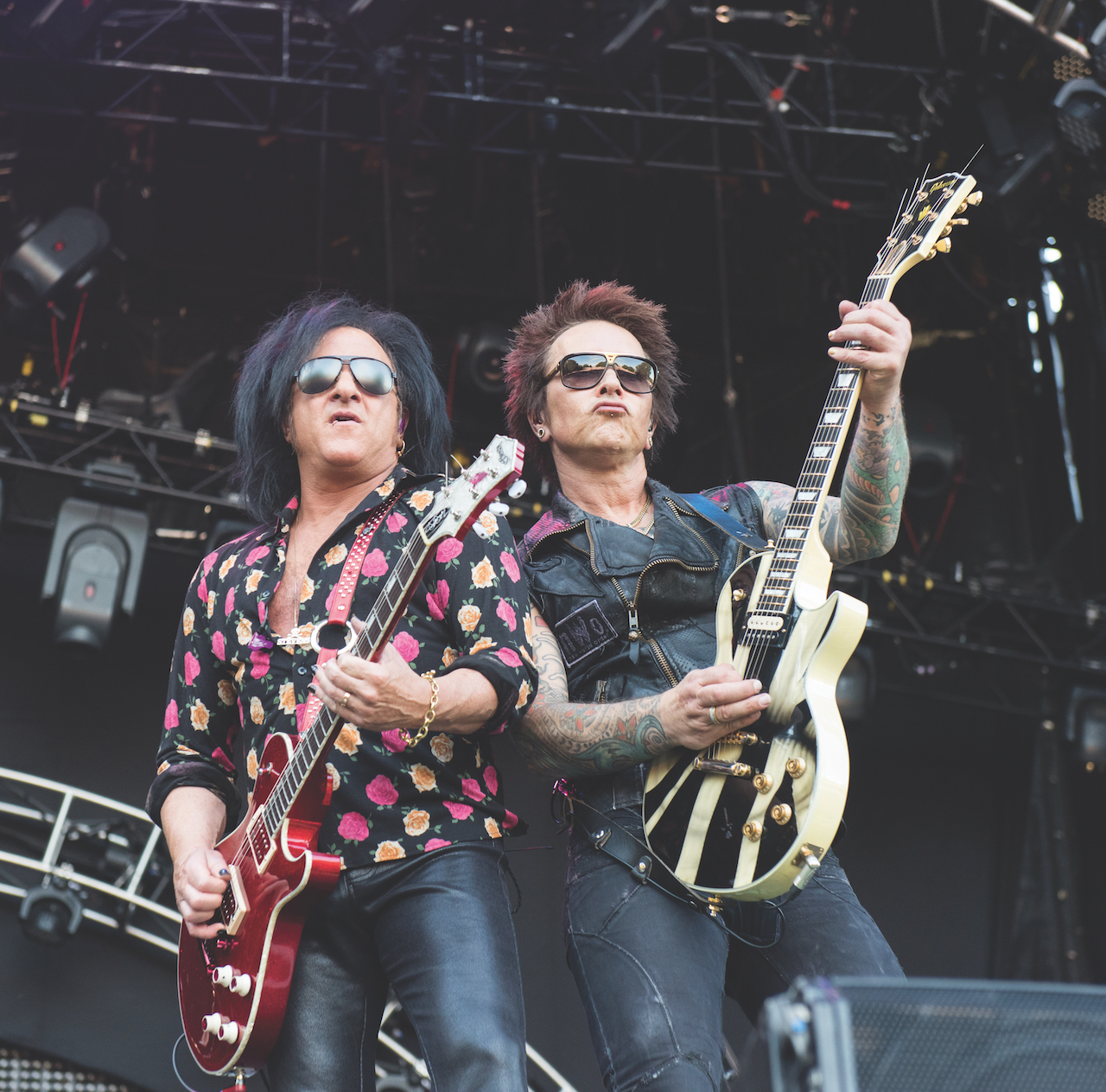
You’re something of the poster guy for networking. It seems as if so much of your success has come from your ability to make friends.
“People skills are important. A lot of people in this business can play rings around me, but they have such an ego. They don’t know how to interact with other musicians or even know how to get on in a tour bus. I’ve got that stuff down. I’m personable and enjoyable to be around – I hope.
“Once I get to a playing situation, I know my role, and I take playing with other musicians very seriously. I learn and rehearse. I make sure my tone is right for the job. I enjoy being a foil for the other musicians, whereas most people just want it to be about them.”
Billy Duffy was a longtime friend and he said, ‘I know you’re not a bass player, but it’s the Cult. It’s a lot of D 16th notes. You’ll be all right’
Let’s go back to when you decided to clean up and get serious about music. You hadn’t played for a long while. How did you get your guitar chops together so quickly?
“I still had some skills from when I was a kid. See, I come from a punk rock mentality, where it doesn’t matter how good you are, as long as you’ve got something worth saying. I formed Stimulator and wrote a bunch of songs – it was a lot of power chords and shit that I could play. Behind the scenes, I woodshedded quite a bit and pushed myself. And then I got asked to join the Cult. We’d be playing football stadiums and arenas.”
You joined the Cult as a bass player. Were you at all comfortable on the instrument?
“It wasn’t a hard transition. Billy Duffy was a longtime friend and he said, ‘I know you’re not a bass player, but it’s the Cult. It’s a lot of D 16th notes. You’ll be all right.’ He encouraged me. I saw it was a great opportunity to play in a big band with some friends.”
Just like that, you were in? Did you have to audition?
“Oh, I auditioned for the Cult. The thing is, I try to live my life with the motto ‘Whatever will be, will be.’ I don’t have a lot of fear walking into situations I’m unfamiliar with, but yeah, [Cult frontman] Ian Astbury can be intimidating. Billy Duffy can be intimidating, and I’ve known him forever. I played with the band, and a couple of days later they called and said I had the job. I was like, ‘Great. Let’s go!’”
The gig with Billy Idol came from playing with Steve Stevens in Camp Freddy. What do you two have in common musically?
“Oh, a lot. He loves the Dolls and the Pistols.”
And prog rock. He can talk Yes and Emerson, Lake, and Palmer for days.
“[laughs] Yeah, well, we disagree there. Anyway, there was a long hiatus with Steve and Billy, but when they got back together, Steve wanted it to be a two-guitar band. He told Billy, ‘I’ve got the guy,’ and that was it. Billy is spectacular. He’s a great boss and has real punk roots.”
The more I play with great lead players, the more I appreciate my position. I like being a rhythm player
Steve is the de facto lead player in the band, but you two do play some intricate parts together.
“We do. Look, Steve is one of the greatest guitar players in the world, absolutely. There’s no way I could do what he does, but I knew what he wanted for a twin-guitar thing. I wasn’t supposed to just do this bedrock thing so he could play. They wanted different tones and textures.
“It was a little scary at first: Steve would be playing this crazy thing, and he’d walk over and go, ‘Can you play a third above this and we’ll do a harmony?’ I’d be like, ‘No, I can’t play like you, man.’ But he pushed and encouraged me, and we worked out our styles.”
Even so, you’re quite comfortable being the “bedrock” as a rhythm guitarist.
“Absolutely. When Camp Freddy came about, before I joined Idol, I was playing with Dave Navarro. Now, Dave is a phenomenal player, but I had the foresight to see that a strong bedrock underneath him was going to make us sound better. On our second gig, Slash came on as a guest. I’m standing there with him, and again, I saw the need for a good solid foundation underneath him.
“The more I play with great lead players, the more I appreciate my position. I like being a rhythm player. Of course, it goes back to what I listen to. When I hear God Save the Queen or Anarchy in the U.K. by the Sex Pistols, my hair stands up with that rhythm guitar.”
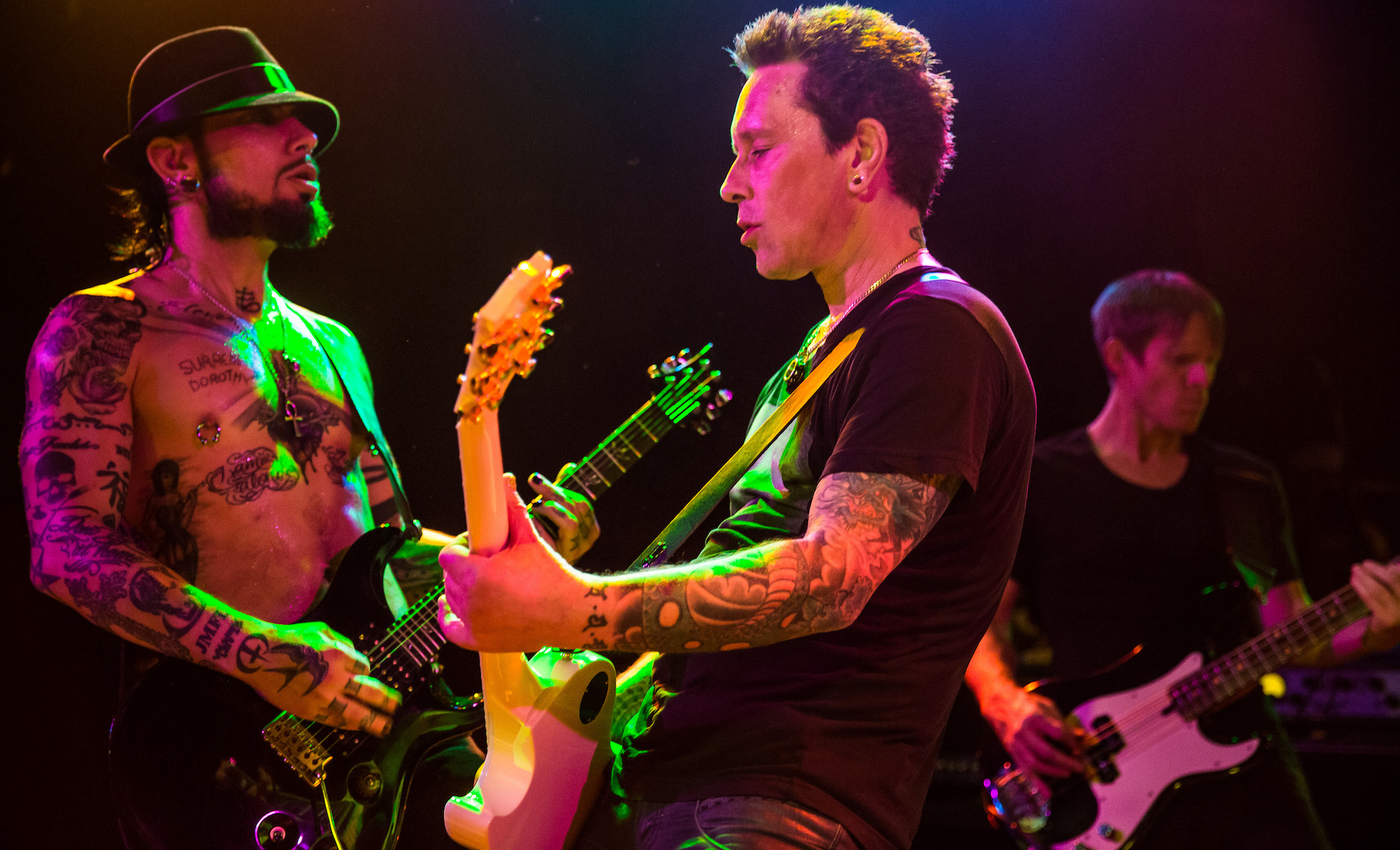
You do play a fair number of leads on your album. I particularly like your soloing on Drowning. That’s fiery and fluid stuff.
“Thanks. My solos stem from Johnny Thunders, Steve Jones and Angus Young – I love that stuff. I know how far I can go with a solo, but I’m not Eddie Van Halen.
“I probably play down my soloing too much. I remember playing one night with Dave Navarro and Billy Gibbons. Billy has a thing he does onstage – he’ll just point at you, and that’s your signal to solo. He pointed at me, and I was like, ‘Shit, I gotta go for it!’ And that’s what I did. After the gig, Billy was like, ‘That was really, really cool.’ I was stunned, but it kind of kicked me into playing lead on other songs.”
You’ve got Steve Stevens, John 5, and Steve Vai playing solos on the album. Did you give them any kind of direction for what you were looking for?
“Hell no. The people on my album – all of them – were given carte blanche to do whatever they wanted. I mean, we can start with Steve Vai – he’s one of the greatest lead players on the planet. How does somebody like me say to him, ‘What if you do this?’ That isn’t gonna happen.
“On Incite the Watch, I knew I wanted a three-key-change solo over an inordinate period of time – that’s all I knew. I sent the track to Steve and said, ‘It goes crazy for a long time with three key changes. Off you go, mate!’”
His lead break is beautifully composed. It starts out legato and spacey and builds to a dramatic flurry of notes.
“Absolutely. He sent it back and it was perfect. It was the same scenario with John 5 on The Ayes Have It. I didn’t have to tell him anything.”
Was it different with Steve Stevens on the song Crack Cocaine?
“Well, yeah, because the three of us wrote the song together – me, Steve, and Ozzy Osbourne. Steve was able to look us in the eyes, and Ozzy was going, ‘Fucking hell, that’s great.’ It was kind of predetermined where it would go, just ’cause we were all in the same room.”
Speaking of Steve Stevens, like him, you’re coming out with your own signature model from Knaggs, the Kenya J-M.
“That’s right. I did a Gibson Les Paul signature model about 10 years ago, which was wonderful. I’m a Les Paul guy, and that guitar came out exactly as I wanted. As time has gone on with Billy Idol, I’ve been using P90s more and more. Steve likes that, because he’s playing his Knaggs SSC, which for all intents and purposes is a twin-humbucker mahogany body. Thanks to Steve and Knaggs, I’ve got a bunch of SSCs, and I’ve loved them. The build quality was just spectacular.
Knaggs said yes to everything – even the color, which was very important to me
“Then they brought out their Kenya J, which has the P90s. They sent me one and I started playing it. The P90s fit Idol perfectly, along with Steve over on the humbuckers. I got to know Joe [Knaggs] and [his business partner] Peter [Wolf], and they came to a gig.
“We were talking, and I’m pretty direct, so I started saying, ‘Well, yeah, but I would do this, this and that.’ And they went, ‘Well, why don’t we make a Billy Morrison signature?’ I said, ‘Let’s go.’ They built me one that’s beyond my wildest imagination.”
Can you give me some specifics?
“I wanted a thicker body, and they said, ‘We can do that.’ Next, I said that I wanted noiseless pickups. Because of the volume and distortion we use, if there’s dynamics in a song, or if there’s a period where we don’t play, you’ve got this hum coming out of the PA. They took care of that. Then I said I wanted jumbo frets because I have fat fingers. They said yes to everything. Even the color, which was very important to me.
“It’s basically a white cream based on Steve Jones’ Les Paul, which started out as Alpine White, but through years of cigarette smoke and beer it became yellowish cream. Gibson did that, and I asked Knaggs to replicate that. They did that, too – they called it ‘Nico Cream.’ [laughs]”
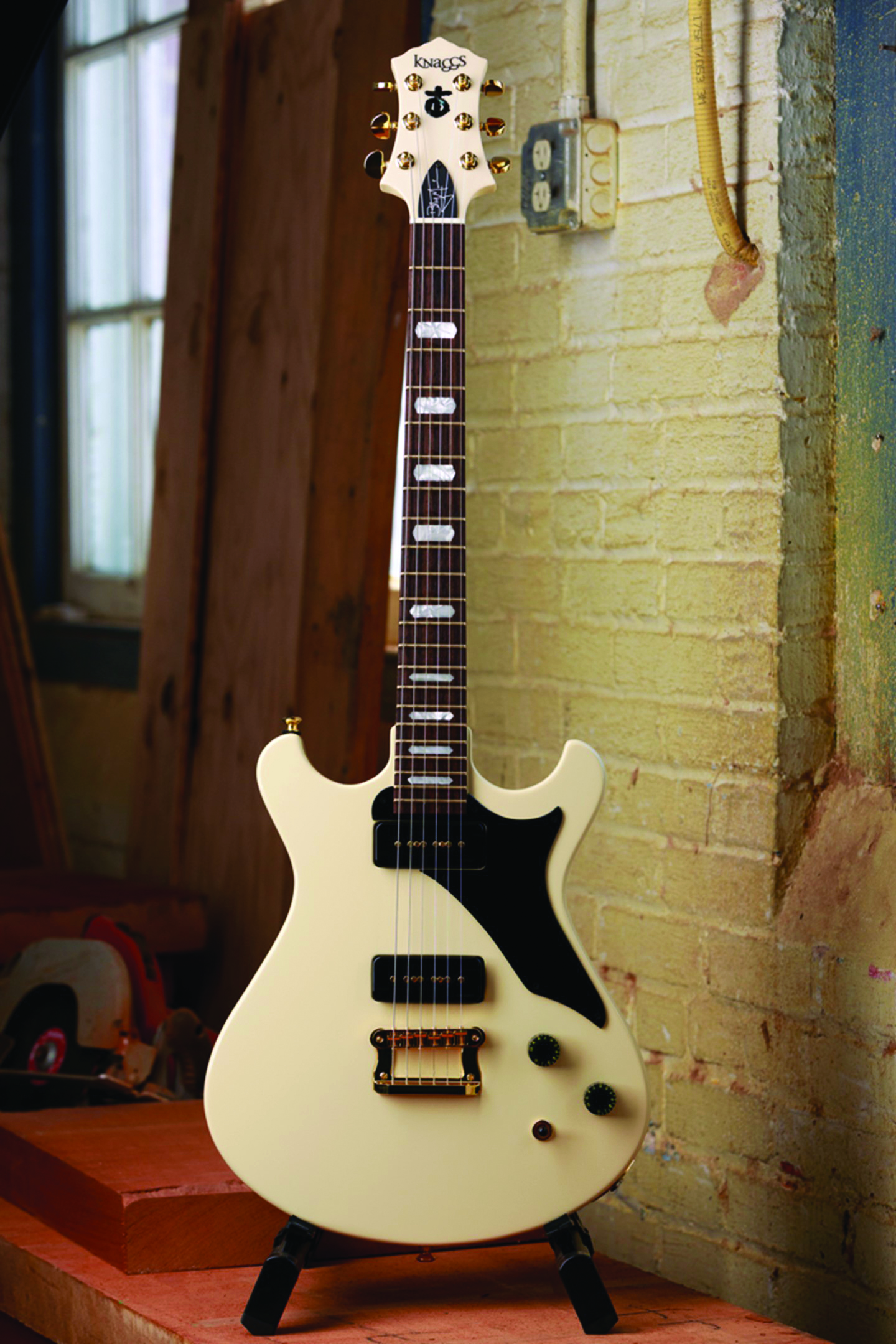
We’ve talked about a lot of your older guitar influences. Do you seek out new music or players to inspire you?
“I’m inspired daily by Steve Stevens. When we’re onstage, I watch him play stuff that has never come from his fingers in the 15 years I’ve been in the band. I say to him, ‘What did you do on Blue Highway tonight?’ And he says, ‘I have no idea.’ To be that fluid on your instrument – that inspires me. But I do love new music. I listen to it all the time, and I get inspired by passion more than the notes they’re playing. If I believe the artist and the song and I feel it, that’s when I go, ‘How did that happen?’”
- The Morrison Project is set for an April 19 release via TLG/Virgin Music Group.

Joe is a freelance journalist who has, over the past few decades, interviewed hundreds of guitarists for Guitar World, Guitar Player, MusicRadar and Classic Rock. He is also a former editor of Guitar World, contributing writer for Guitar Aficionado and VP of A&R for Island Records. He’s an enthusiastic guitarist, but he’s nowhere near the likes of the people he interviews. Surprisingly, his skills are more suited to the drums. If you need a drummer for your Beatles tribute band, look him up.


